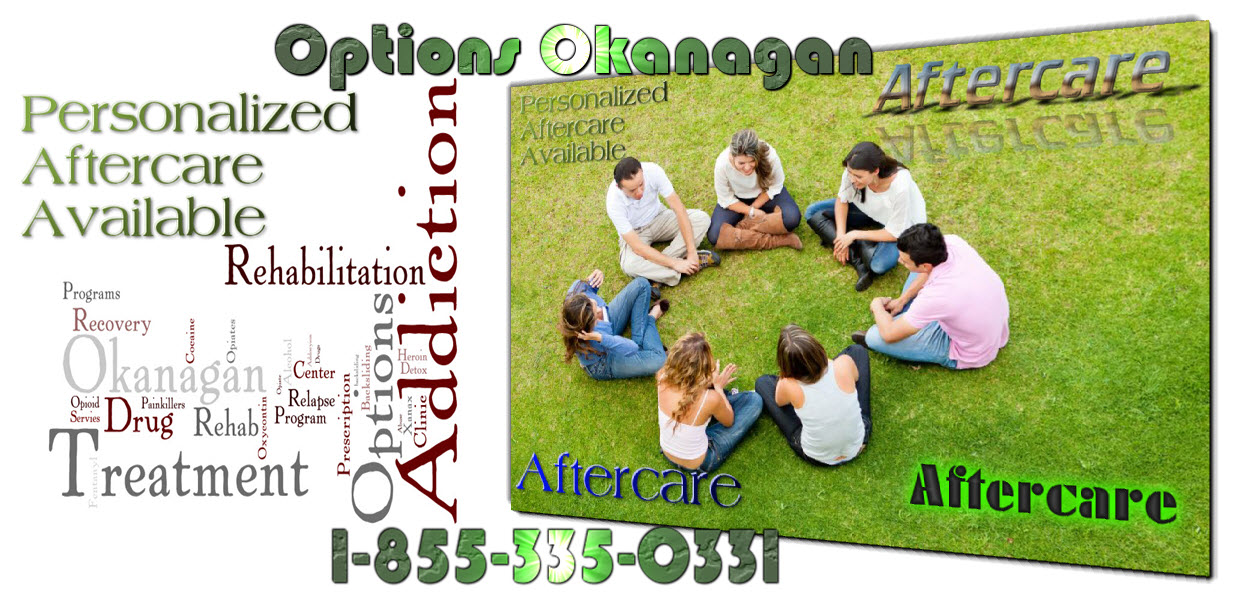Why aftercare is crucial in opiate, drug and alcohol addiction recovery in Vancouver, Victoria, Kelowna and other parts of British Columbia – Options Okanagan Treatment Center in Kelowna, British Columbia treating Opiate addiction and recovery.
Comprehending The Cross Over From Addiction Therapy To Aftercare
For men and women who have arrived at the other end of addiction treatment, the temptation exists to think they have no more obstacles to deal with. Even though acknowledging help for an addiction issue is in itself an excellent accomplishment, there is still a lot more work to be accomplished. The truth is, in actuality we could declare that it is the period of time following the primary treatment, where the challenging work really takes place. It is for this purpose that we are likely to acknowledge on the importance for a amount of aftercare, specifically for a number of years following recovery.
Necessary Coping Strategies For The Recovery Period
A further cause of relapse is the absence of the necessary coping strategies to lead an enjoyable life during recovery. It is inevitable that life will have great moments and tough moments, it is vital that the individual knows how to cope in both scenarios. When an addict feels that life is becoming unbearable, their first thought will be to turn to substance abuse. Individuals who manage to get sober but don’t learn coping strategies face a continual uphill challenge, as well as a higher risk of relapse.
Why Aftercare Is Vital
The chance of staying sober and enjoying a longer life is enjoyed by those who have a form of aftercare. Keeping motivation levels high and providing support when necessary is all part of aftercare. Whilst treatment facility programs provide individuals with a lot of important information and necessary skills, the bulk of the learning should happen when everyday life is resumed. New challenges call for new solutions, and the individual will learn to create them. In this way their coping strategies are developed and refined over a period of time.
For people who do have a relapse, their behavior tends to follow a specific pattern, we refer to it as the relapse process. The process starts with staying in recovery. The process will ultimately lead to a relapse, if it is not handled with the effective use of aftercare. Relapse triggers can be identified much quicker by people who have aftercare. Such individuals are also in a better position to sense alarm bells ringing if they are starting down the path to relapse.
The Various Forms Of Aftercare
The types of aftercare vary. Some rehab facilities will provide aftercare for individuals who have successfully completed the program. Individuals themselves can organize other forms of aftercare.
* Out of all the aftercare types, Twelve Step Groups are the most common. The recommendation is for members to have lifetime regular attendance. For individuals who have recently recovered, the suggestion is to attend 90 meetings within 90 days. The lifestyle offered by Twelve Step Groups is effective for many people. Conferences, dances and conventions also provide a social side to these groups.
* Other support groups also exist, in addition to the Twelve Step Program. Since some individuals are not so comfortable with the spiritual side to the AA, other groups can prove to be a better option. From these other groups, Rational Recovery is likely the most popular.
* After rehab individuals may be offered booster sessions. Whilst many treatment facilities do not yet offer such sessions, their effectiveness is certainly becoming widespread. Such a sessions happens several months following discharge from the rehab facility. As well as a debriefing of their recent experiences, they will be taught new skills and strategies to continue coping. Since such sessions focus on boosting motivation levels, they can be very effective in lowering the chance of a relapse.
* Aftercare can also come in the form of counselling sessions. The individual will have the opportunity to explore the reasons behind their addiction, as well as discuss current challenges.
* For individuals who suffer from an additional mental health problem, dual diagnosis support is necessary. Depression and other mental conditions can often be experienced by addicts. At times such conditions are related to the addiction, or in other cases they existed before addiction. When dual diagnosis is not treated, the risk of the individual feeling dissatisfied with life, and in turn having a relapse, is higher. The type of dual diagnosis will determine the best form of support.
Options Okanagan Opiate and Alcohol Treatment Centers in Kelowna, Salmon Arm and Vancouver, British Columbia – Men and Women are recovering and healing from Alcohol and Drug Abuse at our treatment center here in the Okanagan right now.
Our unique and distinctive Opiate Drug and Alcohol treatment program allows men and women to come in from Calgary as well as Edmonton as we offer airport pickup.
Numerous clients come to us from Vancouver, Calgary and Edmonton and other locations in Alberta and even other provinces for Opiate addiction treatment, heroin drug treatment, many other drug and alcohol addictions for rehabilitation because of the uniqueness of our treatment center.
Our Treatment Location:
Options Okanagan Opiate Treatment Center
551 Sherrydale Crescent, Kelowna, British Columbia, V1V 2E6
Toll Free Phone Number : 1-855-335-0331





